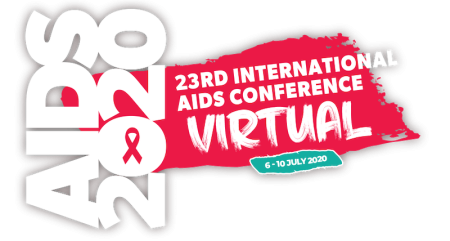
A dozen sessions with involvement by HRSA staff and/or featuring agencies funded by Ryan White HIV/AIDS Program (RWHAP) are now available for viewing (and in some cases listening) on the online platform for AIDS 2020, the Virtual 23rd International AIDS Conference.
Sessions cover such varied topics as cost-effective of HIV care, trauma-informed care, and HIV services for specific populations in the U.S. and internationally. To ease your search, we provide direct links to sessions uncovered using the search terms "HRSA" and "Ryan White."
HRSA and RWHAP Sessions at AIDS 2020
Cost-effectiveness of the health resources and services administration's Ryan White HIV/AIDS Program and the projected impact of the United States' Ending the HIV Epidemic Initiative. PEE1374. Multiple HRSA staff and contract partners contributed to this poster, which presented these results:
"Over a 50-year time horizon, the RWHAP is associated with a 25 percentage point increase in viral suppression, an 18% decrease in new HIV infections, and a 31% decrease in the number of deaths. Compared to the non-RWHAP scenario, the number of quality-adjusted life years (QALYs) would be 2.7% higher, and cumulative health care costs would be 25% higher, yielding an incremental cost-effectiveness ratio of $29,573/QALY. Under the 10-year period of the EHE Initiative, over 700,000 people with HIV are projected to be served by the RWHAP, approximately 200,000 more than the current RWHAP. Decreases in new HIV infections and deaths and increases in viral suppression are primarily driven by activities to re-engage people with HIV who were previously lost to care."
Housing status and HIV viral Load suppression among Alameda County Ryan White clients. PEF1866. This poster highlighted the benefit of RWHAP services to those with unstable housing.
Trends in HIV risk behavior and care outcomes among Hispanic/Latino MSM in the United States: A systematic review of national surveillance data. PEC0740. This CDC session utilized RWHAP data reports.
Viral suppression and barriers to medical care engagement in a national probability sample of HIV-positive young black men who have sex with men. PED1124. This CDC session presented Medical Monitoring Project data. The results:
"Overall, 47% of YBMSM had SVS. SVS was significantly lower among YBMSM who experienced homelessness than those who did not (29% vs. 50%), did not receive care in a Ryan White HIV/AIDS Program-funded medical facility than those who did (39% vs. 53%), were not engaged in care compared with those who were (12%* vs. 64%), and were not taking ART compared with those with adherence scores <85 or >85 (7%* vs. 54% or 56%). The most commonly reported barriers to care engagement were problems with money or insurance (64%*), having other things going on in one's life that made getting care difficult (47%*), and not feeling sick (33%*)."
Financial insecurity and unmet needs among people living with HIV due to the COVID-19 pandemic: Development of a crisis response model in a Ryan White HIV/AIDS program clinic. LBPED39. This poster by the University of Virginia RWHAP clinic documented dramatic increases in financial insecurity and many individuals working in industries heavily impacted by COVID-19 in terms of financial insecurity and subsequent needs. The conclusion: "In the setting of large-scale crisis, preparation facilitates rapid response. For RWHAP, a proactive plan for urgent needs assessments could be included as part of the HRSA continuity of operations plan already required for RWHAP clinics."
So much to lose: A review of 25 bariatric surgery cases in people living with HIV (PLWH) at an urban, Ryan White-funded HIV clinic. PEB0195. This session "evaluated outcomes following bariatric surgery in a cohort of PLWH at an urban, Ryan White-funded HIV clinic."
Improving the access to and retention in HIV primary care for African American transgender women in Oakland, CA, USA. PED1114. This project was part of HRSA SPNS Transgender Women of Color Initiative. The conclusions:
"Qualitative data from the peer-based Princess Project showed that personal engagement with Health Educators was a key to the participants' successful retention to the project. Client-centered motivational enhancement intervention with transgender Heath Educators, effectively increased the participant's skills to exercise self-reflection and empowered them to focus on their health and well-being. Future programs to increase their engagement in HIV primary care need to address stigma in African American communities through educational media campaigns."
Achieving the "Third 90" for adolescents and young people on antiretroviral therapy in Eastern Kenya: A quality improvement collaborative (QIC) to improve viral load test utilization. PEE1535. This session includes several HRSA Global HIV/AIDS Program staff.
A Quality Improvement Collaborative (QIC) for HIV-positive adolescents to improve immediate ART initiation at 25 Health Facilities (HF) in Lusaka, Zambia. PDE0307. This session also includes several HRSA Global HIV/AIDS Program staff.
Disease with trauma: Reflections on the systemic integration of trauma-informed HIV care. PED0868. Community-based participatory research (CBPR) methods were used to recruit a sample of Ryan White-funded HIV service providers familiar with trauma-informed care.
Beyond interpretation: A case for culturally tailored models of care and peer support for Spanish-dominant Latinxs living with HIV in the South. PED0900. This poster included clients in a RWHAP-funded clinic.
Insurance coverage and viral suppression among people with HIV in the United States, 2015-2017. This Kaiser Family Foundation examined insurance coverage for HIV care by various public payers (including the RHWAP) as well as private payers. PEF1884.Poster Channel - Track F